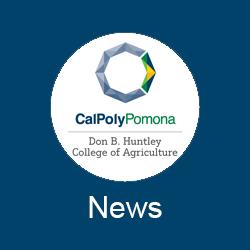Faculty, Students Brainstorm Urban Ag Ideas at Forum

Hydroponic and aquaponic farming. Food justice. Community gardens.
Faculty and staff from across the Cal Poly Pomona campus convened for a Feb. 28 forum to discuss the various projects they are working on related to urban and community agriculture.
There is lots of interest in the subject, fueled by consumer and societal trends such as rising income equality and food insecurity said Rachel Surls, a Cal Poly Pomona plant science lecturer and sustainable food systems advisor for the University of California Cooperative Extension, who assisted the college in drafting the plan.
“Its popularity can be seen locally, around Southern California, across the state the nation and the world,” she said.
The Huntley College of Agriculture, which organized the forum at AGRIscapes, is developing an urban and community agriculture strategic plan.
Cal Poly Pomona is especially well positioned to become a leader in the area, because it has the only four-year agricultural program in Southern California and has resources like Spadra Farm and greenhouses, she added. There’s also a network of urban farms in the region.
The university could become a regional leader by holding an annual conference, mobile clinics, and organizing apprenticeships that showcase and demonstrate the potential of urban agriculture, Surls said.
In addition, there’s strong interest across campus in urban agriculture and existing student-engaged learning projects in progress, which raise the potential for interdisciplinary programs on the subject, she added.
“There’s lots of opportunity for student entrepreneurship and hands-on experience,” Surls said.
The Huntley College of Agriculture created a minor for students in urban and community agriculture starting in 2018. Students can take courses in everything from small-scale farm production – growing herbs in the Collins College of Hospitality Management’s culinary garden – to urban agriculture policy and business models.
“Ultimately, students will be presenting business plans not only to me and their classes, but to the entire county of Los Angeles,” said Aaron Fox, an assistant professor in plant science.
The students will present their plans at Pando Days, an event designed to generate ideas to make Los Angeles County a more sustainable community, he said.
In the future, Fox hopes to expand the program to include students from other majors across campus and also create an advisory board.
Faculty from other colleges on campus spoke of their projects related with urban and community agriculture.
Analena Hope Hassberg, an assistant professor of ethnic and women’s studies, talked about trying to promote food justice in South Los Angeles.
The region is half the size of the Westside, but with twice the population, she said. However, three-quarters of the food system is fast food, making it difficult for residents to find healthy alternatives, Hassberg said.
Community Services Unlimited, a nonprofit organization for which Hassberg serves as board president, provides produce subscriptions and gardening and nutrition workshops through the Paul Robeson Community Wellness Center.
Pomona also suffers from an overabundance of liquor stores and fast food restaurants and a lack of fresh produce, said Teresa Lloro, an assistant professor of liberal studies.
More than half the population also lives below the poverty line, she said.
The Pomona Community Farmer Alliance, which supports a local farmer’s market is addressing the inequality by providing garden workshops and free seeds, said Lloro, who is a core member of the alliance.
In addition to presentations, guests at the forum observed poster presentations on some of the projects and programs that were discussed.
There were also tours of the Children’s Garden at AGRIscapes, as well as a hydroponic and aquaponic farming systems – the latter still under development – in the adjacent greenhouses.
